Shah Lab Announces 2021 Grant Recipients
The Shah Family Global Innovation Lab is pleased to announce its grant recipients for 2021. These awards are made possible through contributions from the Shah Family Endowment, a $2.5M gift from Manu and Rika Shah.
In the Fall of 2020, we collected twenty problem statements from our implementing partners, both domestic and international. We then connected forty-four Purdue faculty members with these statements tackling some of the most significant environmental and technological challenges facing the world, related to sustainability, food security, sanitation, and more. After early morning and late-night zoom discussions between faculty and partners worldwide, our faculty presented their proposals. Eleven judges evaluated the proposals and determined six to receive monetary grants between $3,000-$40,000.
Dr. Gerald Shively, Associate Dean and Director of International Programs in Agriculture (IPIA), on behalf of the College of Agriculture (CoA), contributed $24,000 of the $120,000 total awarded. CoA funded the entire design grant for the Seed Drill Technology project and cost-shared the funding for the Fall Armyworms in South Sudan project.
Congratulations to the winning teams. Thank you to all involved for your passion, creativity, and hard work!
2021 Shah Labs Seed and Design Grant Awards
Low-cost Lighting for Girls to Read
 Team: Jennifer DeBoer, PI, Asst. Professor of Engineering Education, Asst. Professor of Mechanical Engineering (by Courtesy); Dhinesh Radhakrishnan, Co-PI, Engineering Education Consultant
Team: Jennifer DeBoer, PI, Asst. Professor of Engineering Education, Asst. Professor of Mechanical Engineering (by Courtesy); Dhinesh Radhakrishnan, Co-PI, Engineering Education Consultant
Partner: Ms. Sarah Havekost, Plan International USA, Senegal
Country: Senegal, and City Kédougou
Grant Amount: $3,000 Design Grant
Project: Many girls worldwide do not have access to a reliable light and power source; learning remotely and at night is a significant challenge. This project aims to provide girls with learning tools to design a low-cost power and light source that can be renewable (solar) and scalable for at-home use. Together with Plan’s GirlEngage program, the project intends to implement a girl-centered, girl-led participatory design process based on Professor DeBoer’s prior work (Localized Engineering in Displacement (LED) curriculum) in Kenya, Jordan, and Zimbabwe.
Sesame Seed Harvesting
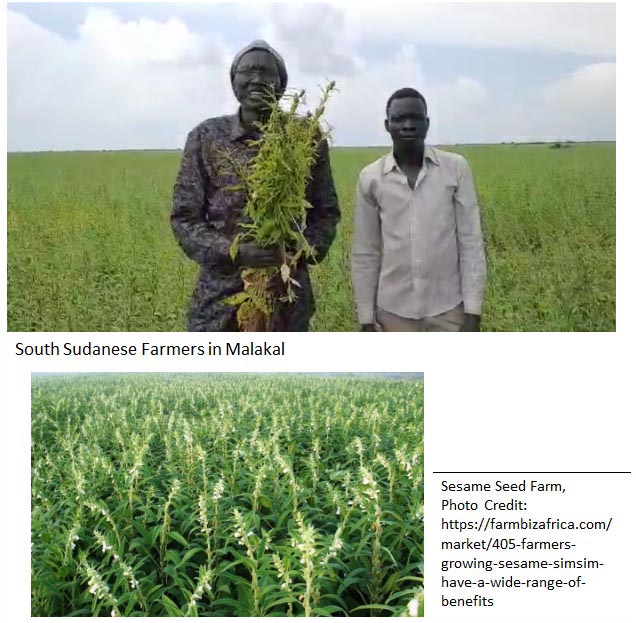 Team: Joseph Sinfield, PI, Professor of Civil Engineering and Director of the Institute for Innovation Science; Edwin Kpodzro, Graduate Student, Mechanical Engineering and Ecological Sciences and Engineering
Team: Joseph Sinfield, PI, Professor of Civil Engineering and Director of the Institute for Innovation Science; Edwin Kpodzro, Graduate Student, Mechanical Engineering and Ecological Sciences and Engineering
Partner: The Hon. James Tor Monybuny, deputy governor of the Upper Nile State and board member of Ayiidit Agricultural Cooperative Society (AACS)
Country: South Sudan
Grant Amount: $3,000 Design Grant
Project: After decades of civil unrest, the resource-rich region of Malakal, South Sudan is looking to capitalize upon its conducive climate and agrarian culture to achieve economic development through sesame oil production. To support this objective, this effort seeks to understand the Malakal context and identify related financial and strategic assumptions that could affect the success of a sesame oil operation, develop means to evaluate these assumptions, and formulate these insights into a plan-to-learn that can subsequently be used to shape a community-driven business model for a related agribusiness.
Seed Drill Technology
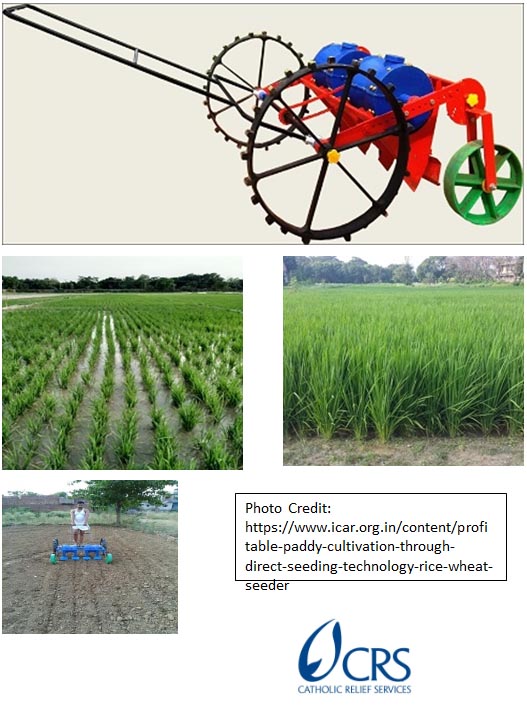 Team: Dharmendra Saraswat, PI, Assoc. Professor of Agricultural & Biological Engineering; Sanjay Patel, Co-PI, Assoc. Professor Farm Machinery and Power Engineering, Rajendra Prasad Central Agricultural University (RPCAU)
Team: Dharmendra Saraswat, PI, Assoc. Professor of Agricultural & Biological Engineering; Sanjay Patel, Co-PI, Assoc. Professor Farm Machinery and Power Engineering, Rajendra Prasad Central Agricultural University (RPCAU)
Partner: Viji Arora, Catholic Relief Services (CRS)
Country: Bihar, India
Grant Amount: $4,000 Design Grant (Funded by CoA)
Project: The project's goal is to provide an appropriately designed seed drill that meets the unique needs of small and marginal farmers in the state of Bihar, India. To address the goal, a listening session will be organized to consider the farmer's perspectives. The project team will evaluate the field performance of the seed drill on collaborating farmer's fields. To ensure the sustainability of the effort, CRS personnel will be trained in the proper calibration, and maintenance of the seed drill, in collaboration with RPCAU. The proposed solution is expected to result in a farmer-friendly, affordable, localized, and scalable technology to meet the needs of targeted farmers.
Water Defluoridation System
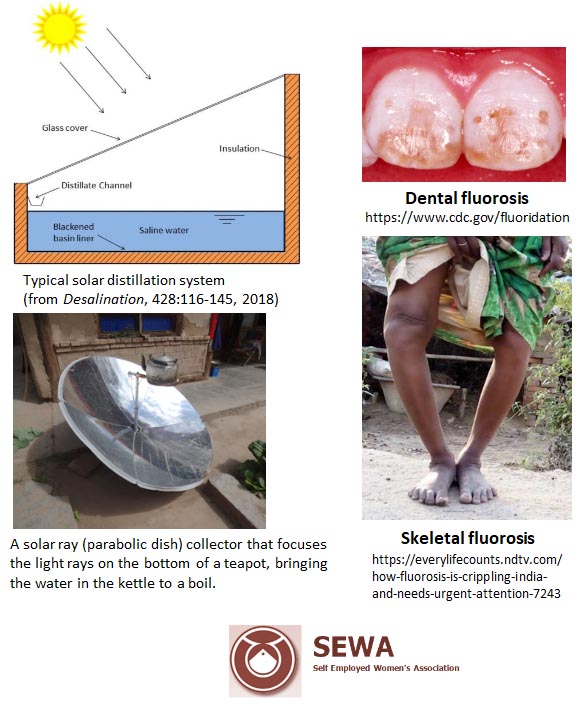 Team: Amisha Shah, PI, Asst. Professor of Civil Engineering and Environmental and Ecological Engineering; Chad Jafvert, Co-PI, Professor of Civil Engineering and Professor of Environmental and Ecological Engineering; George Zhou, Co-PI, Assoc. Professor of Civil Engineering and Environmental and Ecological Engineering; Sruthi Dasika, Graduate Student, Environmental and Ecological Engineering
Team: Amisha Shah, PI, Asst. Professor of Civil Engineering and Environmental and Ecological Engineering; Chad Jafvert, Co-PI, Professor of Civil Engineering and Professor of Environmental and Ecological Engineering; George Zhou, Co-PI, Assoc. Professor of Civil Engineering and Environmental and Ecological Engineering; Sruthi Dasika, Graduate Student, Environmental and Ecological Engineering
Partner: Ms. Rehana Riyawala, Self Employed Women’s Association (SEWA)
Country: India, Dungarpur, Rajasthan
Grant Amount: $30,000 Seed Grant
Project: This project aims to provide a cost-effective and affordable defluoridation treatment and monitoring system for local communities in the Dungarpur, Rajasthan district. Many of the residents in this region use groundwater with a high fluoride concentration, affecting their health and well-being. Two defluoridation treatment technologies will be explored, including solar distillation and electrochemical filtration. Low-cost detection methods that will be evaluated will include measuring fluoride concentrations in water samples by inducing a color change after adding an indicator. The color change will be quantified using a simple hand-held monitoring device.
Overuse of Hospital
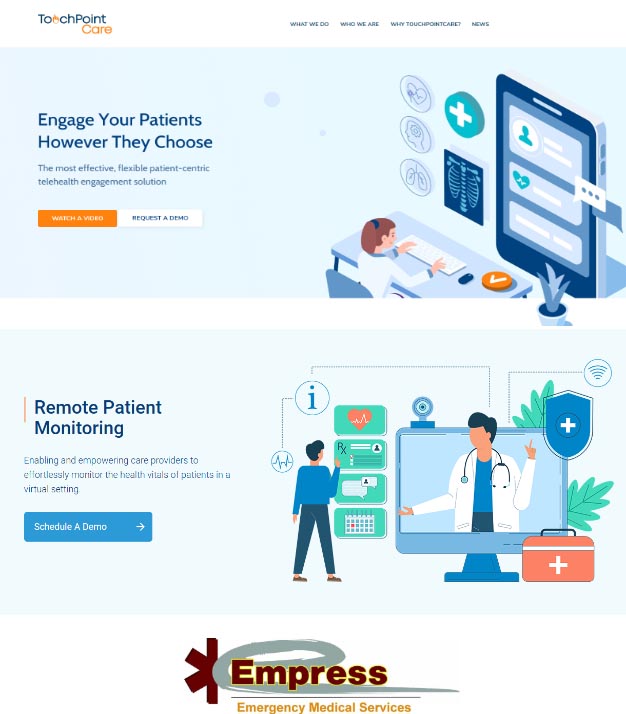 Team: Nan Kong, PI, Assoc. Professor Biomedical Engineering; Nichole Adams, Co-PI, Clinical Assistant Professor, RN, CEN
Team: Nan Kong, PI, Assoc. Professor Biomedical Engineering; Nichole Adams, Co-PI, Clinical Assistant Professor, RN, CEN
Partner: Mr. Hanan Cohen and Mr. Richard Straub, Empress Mobile Integrated Health
Country: USA, NY
Grant Amount: $40,000 Seed Grant
Project: The goal is to develop a digital health platform that relays self-reported data from clients in the community-based care support program to the paramedics. Clients of this program suffer from chronic conditions and struggle to manage health independently, thus having a high risk of hospital readmission. This data will help Empress identify clients who need intervention before visiting an emergency room or being readmitted to the hospital. On the care provider side, a staffing dashboard will be developed for our partner to better prioritize which patients to be seen and better manage their staff for daily operations.
Fall Armyworms in South Sudan
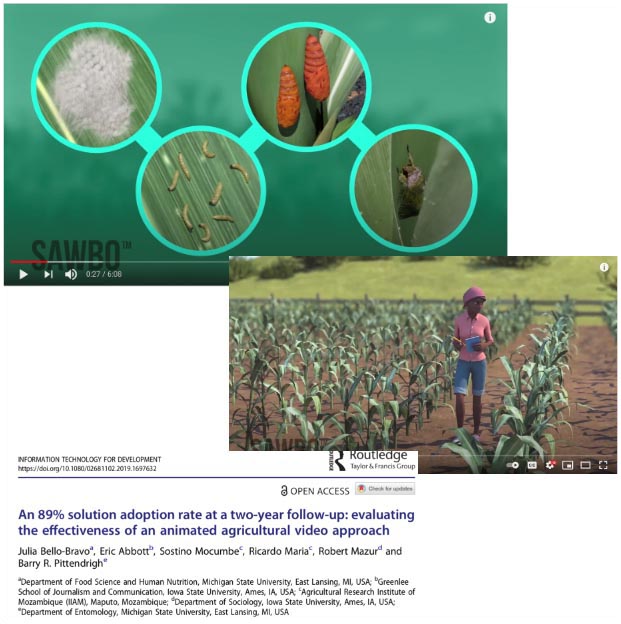 Team: Julia Bello-Bravo, PI, Asst. Professor of Agricultural Sciences Education and Communication; Barry Pittendrigh, Co-PI, John V. Osmun Endowed Chair, Department of Entomology; Christian Krupke, Co-PI, Professor of Entomology
Team: Julia Bello-Bravo, PI, Asst. Professor of Agricultural Sciences Education and Communication; Barry Pittendrigh, Co-PI, John V. Osmun Endowed Chair, Department of Entomology; Christian Krupke, Co-PI, Professor of Entomology
Partner: Mr. Peter Macharia, World Concern
Country: South Sudan, Africa
Grant Amount: $40,000 Seed Grant (Cost-share with Purdue Ag, $20,000)
Project: Scientific Animations Without Borders (SAWBO) is a Purdue University-based program focused on research for scaling and scaling for research. What does this mean? SAWBO researches the effectiveness of educational content in animations, scaled to tens of millions globally across numerous languages, diverse cultures, and literacy levels. We examine how these educational interventions can have a positive real-world impact on those living on just a few dollars a day through this process. SAWBO then studies this impact to develop “next steps” scaling strategies to achieve even greater global impact. Currently, international smallholder farmers are in an all-out fight against the Fall Armyworm, an insect pest that is devasting their crops and livelihoods. The Shah Lab investment will allow SAWBO to develop and research the impact of animated educational technology intervention on Fall Armyworm control. Our university-NGO-private sector partnership approach provides farmers an intervention that is safe for the environment and human health. We will experimentally test the impact of a linguistically adapted animation intervention on the control of Fall Armyworm on maize crops targeted to South Sudan farmers. This research could also provide critical information necessary for scaling this solution across additional countries for even greater impact.
